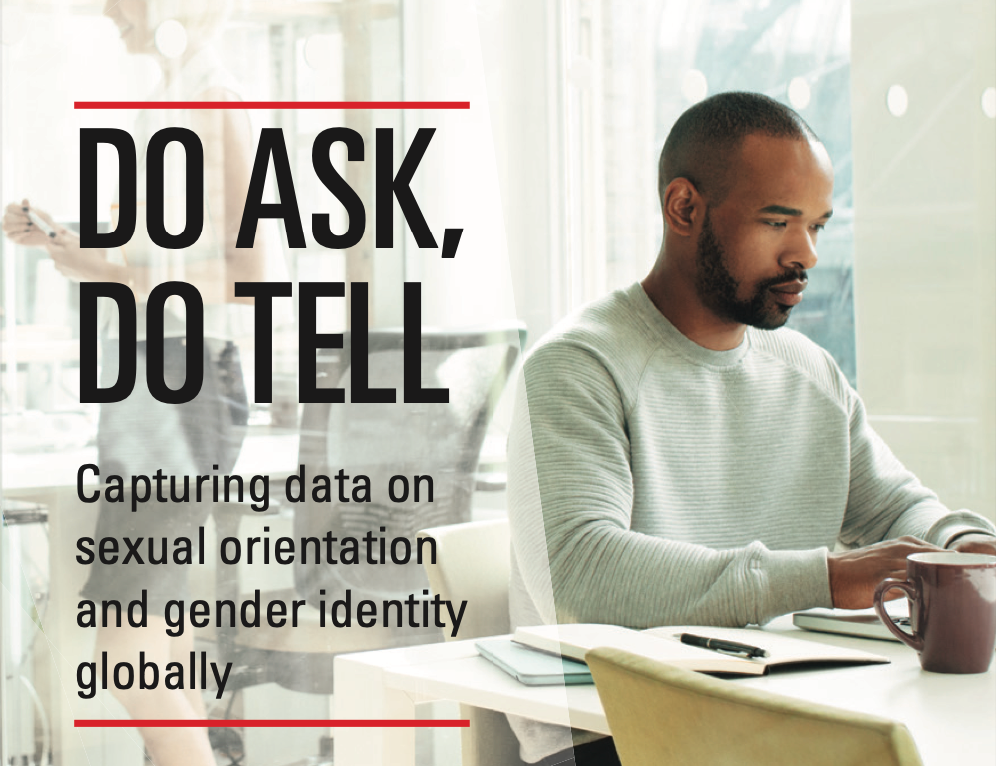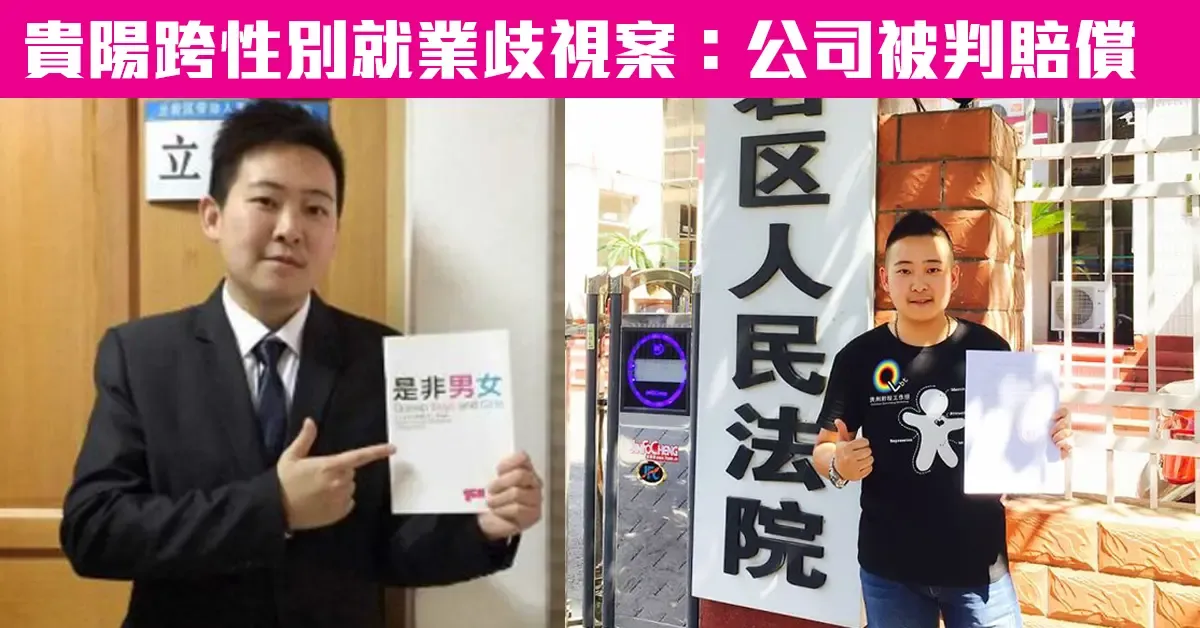[Workplace Dismantling] Employers ask job applicants about their sexual orientation to promote diversity and potential discrimination? Corporate Inclusion Consultant: Do at least three things...

Written by: Proxlogue, Cindy
Text Editor: Cindy
Website Editor: EQ
Follow GDotTV Telegram Channel,
Stay up-to-date with the latest news on G-spot TV!
Earlier , a multinational bank in Hong Kong asked job applicants for their personal information such as sexual orientation, gender identity, etc. on their recruitment webpages. Although the relevant page can choose to fill in "no answer", the company also explained that the collection of gender/gender information is only for the purpose of understanding the background of employees, which is convenient for Diversity policy in place, but still job seekers feel uncomfortable being asked about privacy. How to collect and process gender/gender information has always been a sensitive issue. In particular, there has been a lack of anti-discrimination laws on sexual orientation and gender identity in Hong Kong for a long time. Job seekers and employees are inevitably worried about being unfairly treated by employers. However, an industry insider of the sexual minorities who has formulated diversity policies for multinational companies explained that companies "going through multiple steps" to collect gender/gender information are usually well-intentioned, not to discriminate against job applicants, but to make companies more gender/gender. The niche is friendly; by collecting and comparing data at various stages of recruitment, entry, work and exit, it is possible to analyze in more detail how the company attracts, recruits, and retains gender/non-niche talents.

Hong Kong currently does not have strict regulations on how employers collect gender/gender information when recruiting, but the government and the Office of the Privacy Commissioner and Peace Opportunity have issued a "Code of Practice" , advising employers to avoid asking for sensitive information when recruiting, and to ensure gender, sexual orientation, etc. It does not affect the hiring and promotion of employees. In some countries, such as Norway, Austria and Germany, laws or past cases expressly prohibit employers from inquiring about sensitive information “not related to the position” such as gender/gender identity, race, religion, etc. during the recruitment process; others such as In the United Kingdom, the United States and many EU countries, because there are anti-discrimination laws that protect sexual orientation and gender identity as a protective net, if job seekers suspect that they have been excluded from recruitment due to their gender/gender identity, they can sue the employer in court and claim compensation against the employer. After collecting sex/gender information, it has a deterrent effect if it is misused for personnel screening. It is worth mentioning that many public and private organizations attach great importance to monitoring internal diversity (diversity monitoring) and encourage the recruitment of talents from diverse backgrounds. How should employers collect and process employees' gender/gender information so as to avoid potential discrimination and relieve job seekers' concerns?
Industry insiders: Multi-faceted analysis of employee gender/gender spectrum helps to review corporate culture and promote diversity
In order to understand how Hong Kong companies generally collect gender/gender information of their employees, Point G interviewed NC, an industry insider who works full-time on diversity and inclusion and is also a LGBT activist. She is currently working as a Diversity, Equity and Inclusion Advisor for a multinational corporation in Hong Kong, where she is responsible for designing and implementing Diversity and Inclusion policies. NC pointed out that how Hong Kong employers currently collect and process gender/gender data "goodwill (good will) of companies, but will do diversity and inclusion work, usually want to promote this corporate culture, not to use data to discriminate against job seekers." applicants”, but pay special attention to whether the process can reassure job seekers and ensure that their data is not being misused. She suggested that any employer who wants to collect employees’ gender/gender information must at least ensure three points: First, let employees fill in the information voluntarily and reserve the right to “not answer”; second, clearly inform employees that relevant information is only used to promote the enterprise’s diversity and sharing. Financial integration has nothing to do with personnel decisions such as admissions and promotions; third, those who can influence employee personnel arrangements, such as direct supervisors, human resources departments, etc., cannot access relevant information to ensure fairness. Taking the company she works for as an example, the colleagues in charge of diversity and inclusion work are relatively independent, and the data collected will not pass through other departments.

Regarding the concerns of some banks asking for gender/gender information earlier, the NC said that the collection of gender/gender information by employers is not common in Hong Kong, and there is no anti-discrimination law to protect the gender/gender minority in Hong Kong. It is normal to worry about being discriminated against. However, she believes that the gender/gender data collected at each stage of application, entry, employment and exit reflects different phenomena. She gave an example: "If the company has 10 transgender applicants, but none of them is accepted, it may reflect the bias of the company's executives." But if none of the applicants are transgender, it may reflect other drawbacks, such as The corporate image is not gender friendly enough, and it cannot attract transgender applicants from the beginning. Therefore, it is very important to sample the gender/gender data at each career stage. Through mutual comparison, it is possible to comprehensively analyze the performance of companies in attracting, recruiting and retaining gender/gender niche talents, and to specifically review and improve the corporate culture.
Some European countries ban anti-discrimination laws on job applicants' sexual orientation as workplace protection net
In some countries, such as Norway, Austria and Germany, laws or past cases expressly prohibit employers from asking for sensitive information "not related to the job" such as gender/gender identity, race, religion, etc. during the recruitment process. In Norway and Austria , according to equality and anti-discrimination legislation in both countries, employers are not allowed to ask for personal data in areas such as sexual orientation, family planning, pregnancy, religion and ethnicity when hiring, unless the question is of "Very important. In Germany, a series of court rulings prohibit employers from inquiring during the recruitment period (job application or interview) of personal data that is not directly related to the "eligibility" of job applicants , including sexual orientation, gender identity, marital status, etc., and job advertisements are in In general, gender-neutral terms should be used, and no specific gender-specific recruitment may be specified, which may constitute direct discrimination.

As for the United Kingdom, the United States and many EU countries, since gender/gender status is covered by anti-discrimination laws, job seekers can sue the employer and claim compensation in court if they reasonably suspect that the employer is treating them differently. Therefore, employers generally do not directly ask sensitive questions during the recruitment process. personal data to avoid being accused of discrimination. It is worth noting that, in order to achieve the purpose of diversity and inclusion, employers can use an anonymous and independently processed "diversity monitoring questionnaire" to collect information on employees' gender/gender, which will not constitute discrimination. On the other hand, the General Data Protection Regulation (GDPR), a general privacy regulation in the European Union, is quite strict. Sexual orientation is classified as a "special category" of personal data similar to race, descent, religious belief, genetics, and biological characteristics. Public and private institutions are required to be more strictly protected in processing, storage and use, otherwise they may face huge fines of up to tens of millions of euros. These legal protections can reduce the risk of improper use and leakage of personal data.
Best not to ask? Equal Rights Organization: Census helps companies understand gender/gender minority employee status
In fact, many foreign public and non-governmental organizations have pointed out that if they can skillfully collect and grasp the status of gender/gender minority employees at different stages of their careers, they can conduct "diversity monitoring" to survey company management, employees and partners. The gender/gender spectrum and feedback will help to review internal policies that are unfair to the gender/gender minority, which is very important to promote a corporate culture of diversity and inclusion. Many companies also hope that by understanding the gender/gender spectrum of their employees, they can more accurately meet the needs of gender/gender minority employees, so that they feel respected, which can also improve work efficiency and promote corporate image in the long run.

Stonewall, an influential gender/gender equality organization in the United Kingdom, has specially launched a corporate guide to encourage employers to properly collect gender/gender information and understand the background of employees, so as to create a friendly workplace where employees are willing to actively disclose their gender/gender identities. Many substantive suggestions, such as: encouraging employees to declare sexual orientation and gender identity in private personal records, adding gender/gender questions to anonymous employee satisfaction questionnaires, conducting annual large-scale internal statistics, etc., were made by Stonewall. feasible solution. The organization also listed a few more general considerations, including replacing "sex" with "gender", offering an "undisclosed" option, stating that "female/male" includes transgender people, Separate questions about gender identity and sexual orientation, etc.
Back in Hong Kong, local rioters have been unable to enact legislation on the most basic sexual orientation discrimination ordinances for many years, lacking legal protection as a minimum protection net, and the chances of gender/gender minorities being discriminated against in daily life, schools and workplaces have greatly increased. At the same time, when they are discriminated against, most of them have nowhere to complain and fail to receive due support, which makes many people feel pressure to reveal their gender/gender identities, especially in the job search stage where power is not equal. Worry about losing job opportunities if you "come out" to your employer. The starting point of Hong Kong companies collecting gender/gender data to promote diversity is certainly worthy of recognition. If in the future, considering the local situation and carefully designing and reviewing the timing and method of collecting gender/gender data, it is believed that the original wish of the company will be more fulfilled.

Extended reading: Guiyang Transgender Employment Discrimination Case: The Company Was Awarded Compensation | Danlan.com
Original link G-spot TV
Like my work? Don't forget to support and clap, let me know that you are with me on the road of creation. Keep this enthusiasm together!

- Author
- More